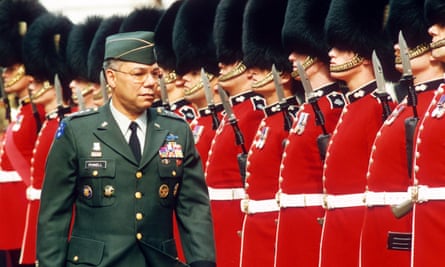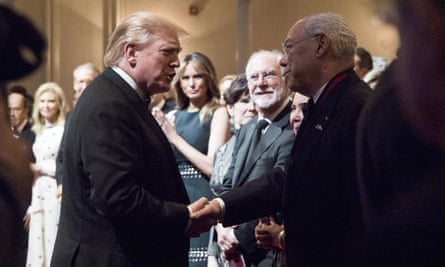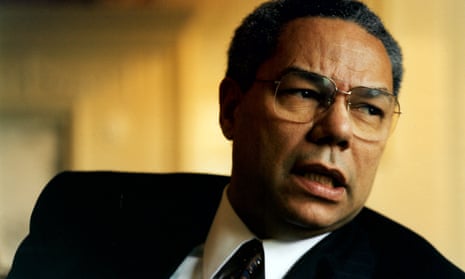Colin Powell wrote a speech in November 1995 announcing a run for US president. He wrote another speech announcing a decision not to run.
When he faced reporters in a hotel in Alexandria, Virginia, Powell delivered the second speech.
Political life “requires a calling that I do not yet hear”, he said, explaining why he would not take on the White House incumbent, Bill Clinton.
So Powell was not to be America’s first Black president. Instead he was, “perhaps, one of the finest Americans never to be president”, John Major, the former British prime minister, reflected on Monday after Powell’s death at the age of 84 due to complications from Covid-19.
America’s loss was arguably also the Republican party’s tragedy. In his remarks, Powell said he would help the party in “broadening its appeal”, suggesting that he could “help the party of Lincoln move once again close to the spirit of Lincoln” and find ways to “heal racial divides” in society.
But by the end of his life, Powell, who previously voted Republican in seven presidential elections in a row, had endorsed Democrats in the last four. He finally quit the party that surrendered to Donald Trump and his mendacious, racially divisive brand of populism.
“Like many Republicans, he felt that the party was leaving him, that the party was taking a rightward turn and he felt increasingly unwelcome,” said Joe Cirincione, who as president of the Ploughshares Fund, a foundation focused on nuclear non-proliferation and conflict resolution, worked closely with Powell.
“He never joined the Democratic party. He preferred the moderate policies of the Republicans, even as he watched the party go, but it was Trump and Trumpism that pushed him out of the party.”
Powell was the son of a seamstress and a shipping-room foreman in Manhattan’s garment district, both immigrants from Jamaica. He wrote in his 1995 autobiography My American Journey: “Mine is the story of a black kid of no early promise from an immigrant family of limited means who was raised in the South Bronx.”

A veteran of the Vietnam war, Powell spent 35 years in the army and rose to the rank of four-star general. He served as national security adviser to Ronald Reagan and was chairman of the joint chiefs of staff under another Republican president, George HW Bush, during the 1991 Gulf war.
He had been a political independent during his military career but, after retirement in 1993 and a bestselling memoir, was wooed by both Democrats and Republicans as potential presidential material. He sided with the latter, explaining that he aligned with Republicans on fiscal responsibility, small government and low taxes, even though he disagreed with some illiberal positions.
Cirincione, now a fellow at the Quincy Institute for Responsible Statecraft thinktank in Washington, recalled: “If he had decided, I think he would have been the Republican candidate. At that time he was one of the most widely respected people in the country. He would have been the candidate to beat if he had decided to go for it.”
But after much agonising, Powell ruled out a White House bid. He publicly acknowledged the potential impact on his family as a factor. His wife, Alma, reportedly feared that he would be assassinated because of his skin colour. Journalist Bob Woodward’s book Bush at War quoted her as saying: “If you run, I’m gone. You will have to do it alone.”
Cirincione added: “He would often say things like, ‘It was the campaigns.’ He wouldn’t mind being president but it was the campaigns that would have killed him. He was comfortable being in leadership roles, including as chairman of the joint chiefs in charge of millions of our troops.
“It was very personal for him because of the health of his wife and he just didn’t want to engage in the kind of gruelling, time-consuming effort it takes to become president at the sacrifice of what he thought would be his family. He wasn’t willing to do it.”
Powell did return to public service when he was named secretary of state to President George W Bush, becoming the first African American to serve as the country’s top diplomat. He publicly presented mistaken intelligence about weapons of mass destruction to justify the March 2003 invasion of Iraq, which he later called it a “a blot” that will “always be a part of my record”.

Powell also came to personify a certain section of the moderate Republican old guard increasingly horrified by the direction of the party. Although he donated to the campaign of the party’s nominee, John McCain, in 2008, he did not support his running mate, Sarah Palin, a smashmouth neophyte whose stoking of white rage represented the opening of a Pandora’s box.
In a major blow to McCain’s campaign, Powell endorsed Barack Obama, a Democrat whom he hailed as a “transformational figure”. He told the NBC politics show Meet the Press: “I’m also troubled by, not what Senator McCain says, but what members of the party say. And it is permitted to be said such things as, ‘Well, you know that Mr Obama is a Muslim.’
“Well, the correct answer is, he is not a Muslim, he’s a Christian. He’s always been a Christian. But the really right answer is, what if he is? Is there something wrong with being a Muslim in this country? The answer’s no, that’s not America. Is there something wrong with some seven-year-old Muslim American kid believing that he or she could be president?”
Underlining his misgivings about the Republican party’s populist-nativist drift, Powell endorsed Obama again in 2012, then Hillary Clinton in the 2016 election and Joe Biden last year. He described Trump as a liar who presented a fundamental danger to the US.

Cirincione noted: “He thought Trump was insane. He thought the risk of the president of the United States using nuclear weapons was greater under Trump than any time in his career. It was that global security risk, plus the threat to democracy, that alienated him from the Republican party.”
The deadly insurrection by a pro-Trump mob at the US Capitol on 6 January was the final straw: Powell declared that he no longer considered himself a Republican. The party that he had grown up with, which espoused the American dream and promoted him to senior roles in government, no longer existed.
Larry Jacobs, director of the Center for the Study of Politics and Governance at the University of Minnesota, said: “Colin Powell came from a working-class background and he never forgot that. The party moved away from the blue-collar Reagan Democrats, which is probably closer to where Colin Powell was, and it became much more of a corporate party, a party that would win elections by stoking racial resentment.
“It became much less inclusive on social issues that Powell was more moderate on. I think the reason he didn’t run for president is he looked at the Republican party and he didn’t see a place for himself. From a practical point of view, he made the assessment he probably couldn’t win the nomination without a lot of conflict and perhaps his reputation being tarnished.”
